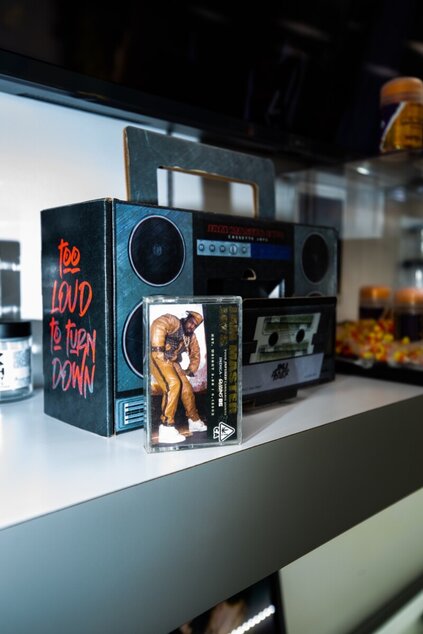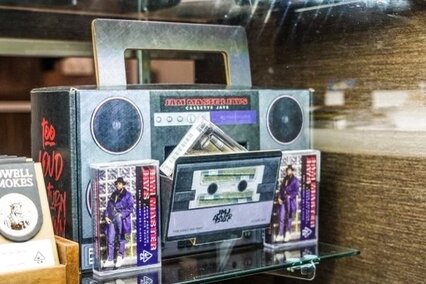Jesse Mizell, son of the late Run-DMC legend, shares the story behind the venture that captures Jam Master Jay’s dual passions for cannabis and music.
Hip-hop and cannabis have always been a match made in heaven. However, with decreasing but still-existent stigma surrounding the plant and society’s outdated opinions on those who use it, some of rap’s superstars were historically unable to showcase their love for the plant. One musician that fans may be unfamiliar with as a big-time enthusiast, however, is the late Jason Mizell.
You may know him better known as Jam Master Jay, one-third of the legendary Queens hip-hop trio Run-DMC.
While you may not be familiar with his history with cannabis, you can rest assured that JMJ was smoking out the pack long before social media made it a way to measure who’s a true smoker and who isn’t. Sadly, Jason Mizell was taken from us in 2002 before he’d get the chance to see and experience the era of legalized cannabis. But that’s not stopping his sons — TJ Mizell and Jesse Mizell — from carrying on his legacy with Jam Master Jays.
Jam Master Jays are sold as a four-pack of cannabis prerolls that come in a cassette tape design, reflecting JMJ’s passion for both weed and music. It is one of the more innovative packaging plays that the industry has seen thus far, so naturally, I needed to learn more.
I was recently able to hop on a call with Jesse Mizell to discuss the JMJs, their products, and the family’s overall plan for the future of the brand — here’s what I learned.
DANTÉ JORDAN: When did Jam Master Jays begin as a company?
JESSE MIZELL: We legitimately started in 2019, but we didn’t launch until October 2020.
DJ: Who is involved in the operations of the brand?
JM: Me, my family, and my brother, mostly. It’s the estate, which I’m a part of, and then it’s me and my other business partner’s company, William Earl. That’s myself, our creative director, and our farmer, the person that does all the growing here in California, as well as all the ideation and the product specs for what we do in the other states going forward. He’s basically our operations partner, and then I have a creative partner, Spencer. He makes all the designs, he helps with all the marketing rollouts.
DJ: What is it like to work with your brother on a project that honors your father’s legacy?
JM: It’s amazing. He’s like my best friend, so we do everything together, whether it’s [working] on events or selling the product.
DJ: Why do you choose to focus primarily on prerolls versus a broader line including flower, concentrates, edibles, etc.?

JM: With Jam Master Jays, I’d decided to focus on prerolls because (1) the name, and (2) when we came up with the name, everyone was dropping cannabis celebrity brands. We didn’t want people to think we were just slapping our dad’s name on any sort of packaging. We didn’t want it to be like “Jam Master Jay’s weed brand” — we wanted it to be Jam Master Jay launching a very unique product that happens to have cannabis.
Going forward, we want to keep that ethos. If we’re going to drop something, even if it is just in a jar, the story behind the cannabis has to have a shock and awe factor. That’s why we haven’t launched weed yet. I don’t want to just go get really good weed from a grower, put it in my own jars, and say “this is a weed brand.” We really want to focus on having integrity behind everything we have someone pay for, especially if we put it in a shop, because that’s how Jam Master Jay did it and that’s how Run-DMC did it.
DJ: Which markets are JMJs currently available in?
JM: We just got to Massachusetts, which is a less built-out market than California, Colorado, and Michigan are, so we’ll be more hands-on out there. We’re working in Nevada, too. We have a team in Nevada ready to go, we just need to make sure it’s the right product.
DJ: Which strains do y’all offer in the four-pack? Do they vary by market or is there consistency across the board?
JM: It varies across markets. The first ones we dropped [in California] were a Tahoe OG and a Gelato blend. In Michigan, we just use whatever’s fresh. They tell us what’s coming down, what people like, and then we just pick from there. The first two strains we used were Nightshade and Cake Batter. In Colorado, we actually did two sativas and two indica joints.
DJ: Have you gotten any feedback on the product from the other members of Run-DMC?
JM: [Darryl “DMC” McDaniels] doesn’t smoke, but he loves the product. He gave us a really good drop for Instagram when we first launched. He also came out for our one-year anniversary when we launched our infused joints at Lemonnade in Van Nuys. I haven’t talked to [Rev Run] about it, but I’m sure he would only have positive things to say.
DJ: What kind of weed did your father like to smoke? Do y’all know?
JM: Snoop told us, “When your dad used to come to the West Coast, he would need to come get that West Coast indo,” which was really the only shit in the world at that time that was thrax. Everything on the East Coast was Chocolate Thai or Jamaican weed. Snoop said, “[Jam Master Jay] would bring that Chocolate Thai and Jamaican shit from the East Coast, I would give him West Coast indo, and then we would put that shit in a blunt.” I like to believe he was just smoking the best weed he could find anywhere.
DJ: What is the next stage of evolution for the JMJs?
JM: We have our line of infused prerolls that’s distillate and kief. It’s a joint that if you smoke it, you’re going to get stoned. Last year, we did a collaboration with Fidel’s that I was really into. It was only for Astor Club, so we didn’t bring it to market.
When it comes to infused joints, I want to do something in our packaging that’s high quality, but also, I don’t want to shock our customers by putting something out that’s at a whole new tier until we get to that whole new tier of quality.
DJ: Who came up with the concept of the cassette tape packaging?
JM: It was a collaborative effort. I got a cassette for Christmas the year we were working on the brand, and that was kind of like, “Yo, let’s do a pack and put it in a cassette.” My business partner did the first sketch-up and we sent it to a printer in Miami. He sent us three iterations before we got the one.
DJ: Any lifestyle brand moves in the works?

JM: Run-DMC just announced their last show; we’ve got a big documentary that will go out with Peacock. In the next couple of years, the [Run-DMC] brand is going to be in people’s faces a lot more. [Run-DMC is] launching a collaboration with Burton that’s coming out next month. Attaching the [Jam Master Jays] to anything that makes sense and not forcing it is going to be the forethought of going forward with the brand shit.
To answer it briefly, there’s a lot of major impact moments coming with the Run-DMC brand, so we’ll be finding our little pockets, whether that be merch or events, on how we can have the Jam Master Jays brand shine a little brighter.
DJ: What have been some of your greatest accomplishments with JMJs? Conversely, what have been some of your biggest hardships?
JM: Those are hand-in-hand. When we launched, we sold like 2,500 units to the Cookies wheelhouse. I was explaining it to my mom and family, if I launched an apparel company, [getting into Cookies is like if] we got into Saks Fifth Avenue on the first order. Experiencing that level of accomplishment on the first run is kind of how it happens when you have a family that has notoriety. ‘Damn, we did this shit, it was a little easier than we thought.’ And then, if it doesn’t sell as well, it’s like, ‘fuck.’
No other brands are selling that much volume unless you have hundreds of thousands of dollars to spend on marketing and product giveaways in California. If it’s not moving as fast as you thought, it’s fine — let’s push it as hard as we can. It was a wave of High Times and all that stuff at first that slowed down because it’s just another brand on the shelf at Cookies when there’s like 50 other brands there. That was the greatest accomplishment: Dropping, and then immediately four months later, doing a deal with one of the biggest preroll brands in Colorado.
DJ: What are your thoughts on eventually entering the market in New York?
JM: I’m going out there this week or next week to have some more conversations with people, but I think everyone who has a license, they don’t really know what their license means. It’s just really early, but I think New York will be a storm for us for sure.
DJ: What is your hope for Jam Master Jays, both in terms of impact on cannabis culture and the cannabis industry?
JM: For us, really, it’s to push my dad’s legacy forward in a positive way.
We like to smoke weed. We’ve been thinking weed is a positive way to get involved with party culture. We would like to push that culture forward and have his name attached to it in a positive way, because he was smoking, and he couldn’t promote that because [Run-DMC] wouldn’t have been given the opportunities they were given.
We’re not a celebrity brand that’s just throwing their name on bags; we want to create intentional products for the cannabis space that people outside the cannabis space can say is innovative, was designed with integrity, and is pushing the ethos of breaking boundaries versus just selling weed. Hopefully, other celebrity brands will start to act like that, too.